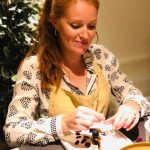Returning to work after having a baby is a huge experience no matter when or how you do it. When we leave the workplace to have our babies we are one person and when we return we have changed in ways that can’t always be seen and understood by those around us. How we prioritise our energy as a working parent is individual to us and often can be the easiest thing to overlook. I believe that small steps in the right direction are how we create meaningful change to prioritise our own energy.
Becoming a parent is a journey of change. We get to know the depths of our capacity and often there is a sense of losing the control we once had over our own lives when we start parenting. Suddenly our entire world revolves around the baby/babies we have brought into the world. As our babies grow, their needs change and before we know it we are gearing up for a new season of juggling work and family life.
Preparing for a return to work
There are so many external factors that we consider as we prepare to return to work. They can include breastfeeding, childcare costs, logistics of drop-offs and pick-ups, separation anxiety, feeding our family, managing diets and allergies, flexible working, baby groups, after school clubs, housework, food shopping, finances, getting a family up and out of the house on time, other caring responsibilities, illness, our boss’ needs, colleagues expectations, partners and grandparents schedules… to name a few.
Overnight we are expected to become masters of managing a chaotic schedule, keeping everyone’s needs in our peripheral vision. The list of people and things to think about and consider is endless. Really, it doesn’t end. There will always be something or someone pulling you in their direction and away from yourself, which is why I champion the act of prioritising your energy as a working parent.
So what about you?
We live in a society where stopping and thinking about yourself is frowned upon in parenthood. Especially for mothers. It can feel like the expectation is that:
If you aren’t pouring out then you aren’t mothering
If you aren’t giving your all at work then you aren’t committed.
This is a downfall of the society that we live in, as Tricia Hersey talks about on her platform The Nap Ministry. Hersey speaks about rest with passion and calls out the oppressive social constructs that lead to the ‘Grind culture’ that she is pushing against in her work.
Parents are struggling and it is a subject overlooked by society at large. I have written about parental burn out and the need for rest before.
Work life balance
It doesn’t take long before life feels like it is happening to us. As we push through the sleepless nights, our children being sick, our workloads growing, and the needs of our business, family, teams and colleagues changing . We can become more and more disconnected from our inner world, our human needs and our own wisdom. If you are tired, struggling and it feels like you are alone, you are not alone. There is a shared experience and conversation helps to normalise the journey of parenting and working.
Time for a new blueprint
As you think about the juggle and the struggle ask yourself what blueprint you are passing on to your children? What do you want to show them about meeting your basic human needs? How do you want them to live if they have a family of their own one day?
If you don’t want this struggle for your own children then now is the time to start creating a new blueprint. Now is the time to change how you are showing up in the world for yourself. It is not selfish, or shameful. It is essential and should be celebrated.
Prioritise your energy as a working parent
You already know what you need but it is possible that you feel disconnected from your inner voice because there isn’t much time in parenthood to stop and think about yourself. What if you start to invite a practice of listening to and prioritising your energy now…
Here’s three small ways to start your journey.
1. Watch your energy.
Different people, places and activities impact our energy. If you haven’t spent much time thinking about your energy before then this might feel strange at first.
Notice how you feel at different points throughout the day, week and month. Keep a log in a journal, on your phone or wherever is most convenient.
Note when you feel:
energised: where are you, what are you doing, who are you with?
rested: where are you, what are you doing, who are you with?
joyful: where are you, what are you doing, who are you with?
low: where are you, what are you doing, who are you with?
sad: where are you, what are you doing, who are you with?
angry: where are you, what are you doing, who are you with?
You get the gist. Keep a log and look out for patterns.
In this exercise we are going to focus on the way we want to feel more often by refilling our energy.
I believe it’s important to hold boundaries around the people, places and activities that we want to limit. But that can be more complex work as it is so individual and layered. This work is more suited to a 1-2-1 coaching session where you can explore what holding boundaries could look like for you. For now, let’s focus on how we want to feel by refilling our energy.
2. Choose your energy.
This will be different for us all but once you have enough data from the above task you can start to think about choosing how you want to feel.
At this point it isn’t about making the changes, it is about making the choice. Making an active choice about how you want to feel more of the time and being intentional by writing it down.
Make a list of the things you choose to do more of. For example if speaking to a specific friend consistently energises you, add them to your list. If going on a walk energises you, add that too. If being in a room that is tidy and organised energises you, add that to the list. It doesn’t matter if it feels impossible to achieve these things, for now let go of the “how”.
3. Invite your energy.
Once you have chosen the things that help you feel energised then you can start to be intentional and invite them into your life more often.
This is about the small details in our daily lives. It is about reframing our thinking and finding opportunities around us every day. Taking tiny steps to welcome more of the good energy.
For example, I have recently stopped using Ocado for our online shopping after 10+ years to save money. I now go to the supermarket once a week and I hate it. So, provided I am shopping on my own, I listen to my favourite podcast: We can do hard things. Suddenly shopping is reframed from a chore I hate to an opportunity to listen to my podcast in peace on my own. I’m not talking about polishing a turd here, I am talking about mindset. I change my thinking mind and find opportunities to welcome more joy.
Small incremental steps
This is not about replacing experiences that drain us with ones that light us up. Although that would be great, there are many responsibilities we hold that we can not do a U-turn on. So instead it is about looking for opportunities to welcome joy in every day, to prioritise our energy as a working parent in small moments. We can only do that if we pay attention to our energy in the first place.
But how does all of this connect with your return to work? Well, it does and it doesn’t. You see this is one of the small ways you can start to prioritise yourself, your energy and your needs in the day to day of busy family and work life.
But it’s not just about going back to work, it is about the lifelong journey that we can take if we want to pass our children a better blueprint for their future so that they might find it easier to prioritise their energy as a working parent
If you are looking for support with your busy lifestyle as a parent check out the work Gemma does through Wavespace Coaching.



